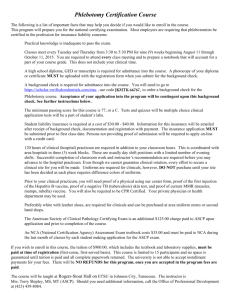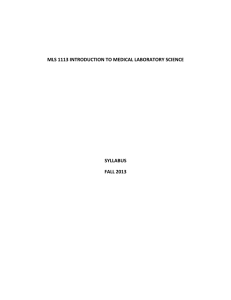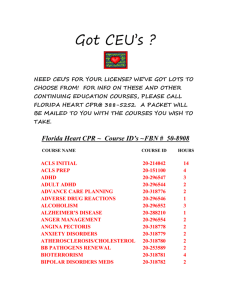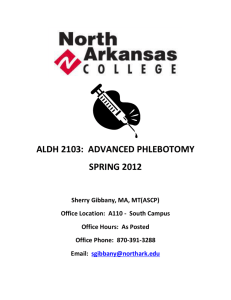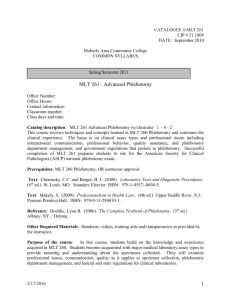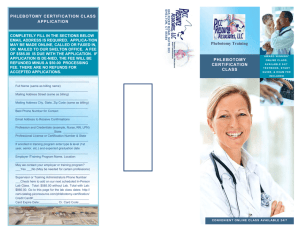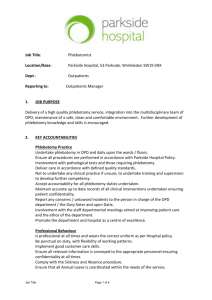aldh 2103: advanced phlebotomy spring 2015 - Portal
advertisement
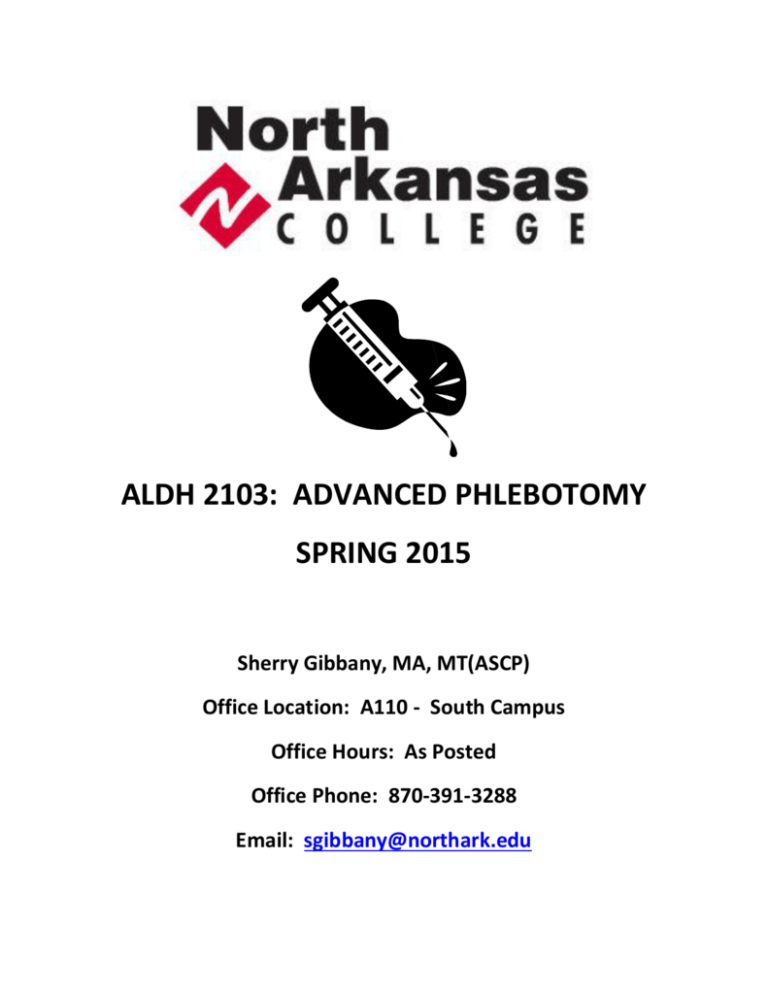
ALDH 2103: ADVANCED PHLEBOTOMY SPRING 2015 Sherry Gibbany, MA, MT(ASCP) Office Location: A110 - South Campus Office Hours: As Posted Office Phone: 870-391-3288 Email: sgibbany@northark.edu NORTH ARKANSAS COLLEGE Harrison, Arkansas ALDH 2103: ADVANCED PHLEBOTOMY Semester: Times: Spring 2015 Monday 1 pm – 350 pm Instructor: Office: Office Hours: Office Phone: Email Address: Sherry Gibbany, MA, MT(ASCP) South Campus, Room A110 As posted 870-391-3288 sgibbany@northark.edu 3 credits Course Description: This course is a continuation of Basic Phlebotomy. This course will go in more depth about clinical laboratory departments and testing, specialized phlebotomy procedures such as: bleeding times, therapeutic collections, difficult draws, blood cultures, glucose tolerance testing. This course will also include in depth discussions of HIPAA, medical and legal issues and healthcare law procedures. The student will also learn to perform waived tests such as: glucose screening, cholesterol screening, urinalysis dipsticks, pregnancy tests and strep screens. This course will also include preparation for the Phlebotomy Certification Examination. This course will be offered on demand only. Prerequisites: ALDH 1013: Basic Phlebotomy or approval of instructor. Must have obtained a C or above in Basic Phlebotomy. Textbooks: McCall, Ruth E. and Cathee M. Tankersley, Phlebotomy Essentials, 5th edition. Lippincott Williams & Wilkins, 2012. References: Garza, Diana and Kathleen Becan-McBride, Phlebotomy Simplified, 2nd ed, Prentice Hall, 2013. Ernest, Dennis, Applied Phlebotomy, Lippincott, 2005. Selected Video Tapes: Basic Venipuncture, Center for Phlebotomy Education, 2004. Blood Collection: Special Procedures, ASCP press, 1991. Blood Collection: The Difficult Draw, ASCP press, 1992. Blood Collection: The Pediatric Patient, ASCP press, 1990. Preventing Preanalytical Errors, Center for Phlebotomy Education, 2004. Avoiding Phlebotomy Related Lawsuits, Center for Phlebotomy Education, 2004. Skin Punctures & Newborn Screens, Center for Phlebotomy Education, 2008. Arterial Blood Gases, Center for Phlebotomy Education, 2009. Teaching Methodologies: Lecture, class discussions, audio-visual presentations, and student laboratory practice. Behavioral Objectives: Upon completion of this course, the student will be able to: 1. To demonstrate a better working knowledge of phlebotomy procedures. 2. Describe necessary safety techniques used in Phlebotomy and other areas of the hospital to insure Universal Precautions are being followed and to prevent infection caused by bloodborne and other pathogens. 3. Describe proper phlebotomy techniques including challenges of phlebotomy, specimen considerations, arterial blood collections and special procedures. 4. Discuss common test tubes used in obtaining a specimen of blood: a. Additive(s) in each tube b. Whether each tube produces serum or plasma c. Tests that cannot be performed on the specimen in each tube and why d. Common tests performed on each tube e. Order of draw tubes f. Department of laboratory where tube most commonly used 5. Discuss blood collection in various populations: newborn, pediatrics, geriatrics. 6. Explain proper procedures for collection of non-blood procedures. 7. Describe the specific transport, handling and processing of blood and non-blood specimens. 8. Discuss legal and ethical issues in phlebotomy. 9. Demonstrate understanding of confidentiality, professional behavior and appearance, communication and patient interaction. 10. Successfully complete all tasks required under “Psychomotor Objectives.” Terminal Psychomotor Objectives: Those objectives marked with a “*” must be successfully completed as written for the student to pass ALDH 2103. 1. *Perform a venipuncture correctly under the direct observation of the instructor. 2. *Perform a capillary puncture correctly under the direct observation of the instructor. 3. *Properly demonstrate the use of the glucometer and cholesterol accucheck and other point of care testing procedures. 4. *Perform an arterial puncture on the artificial phlebotomy devices. 5. *Properly prepare a phlebotomy site for blood culture/unit of blood. Methods of Evaluation: Lecture quizzes/assignments Lecture tests Laboratory participation and completion of all exercises Laboratory pracitical examinations/assignments/quizzes Final examination All assignments, tests, quizzes and practicals will be graded on a point basis. Final grades will be determined by total points accumulated in both lecture and laboratory sessions. Grading Scale: A = 90 – 100% B = 80 – 89% C = 70 – 79% D = 60- 69% F = below 60% Grade Breakdown Exams - 35% Final - 20% Homework – 10% Quizzes – 15% Practical – 20% MISCELLANEOUS Attendance: In accordance with the attendance policy outlined in the college catalog, students are expected to attend all class meetings. Any penalties for absences may be left to the discretion of the instructor. It is the responsibility of the faculty members to advise their classes, in writing, of their attendance policy. It is the responsibility of the student to drop the class when becomes clear that the student has missed too many days or is not successful. The instructor will attempt to contact the student to inform them of their position If you have an excused absence please inform the instructor. Class attendance is a reflection on your job performance in a profession. Feel free to have a classmate to tape the lecture if an absence is necessary Have a classmate turn in any assignments that may be due that day. Most lectures will be recorded and posted on portal. If a test is missed from any component of this course, due to illness or other reason, it MUST be made up by the next class session, prior to class. All missed tests are placed in the testing center the morning following the test and must be taken before the next class session. Should you fail to take an examination prior to the next class it will be given a grade of zero (0). If for any reason a curve is given on a test, it will not be given to students that make up a test. All work is done on the assigned date at the beginning of the class session. Because this class only meets once a week, all assignments must be turned in 2 days following class meeting. Assignments can be emailed to me via sgibbany@northark.edu, placed in my mailbox in the faculty/secretary’s lounge or faxed to me. Any assignment not handed in on time will lose 30% of the grade for the assignment. All pending assignments must be handed in prior to the last day of class noted on the Lecture/Laboratory Session Schedule. No assignment will be accepted after this date and a zero (0) will be given for each assignment missed Tardiness Policy: PLEASE DO NOT MAKE A HABIT OF BEING TARDY, IT IS DISRUPTIVE TO THE CLASS. THIS IS ALSO A POOR REPRESENTATION AS A PROFESSIONAL. Academic Dishonesty & Integrity: Academic dishonesty is defined on page 33 of the Student Handbook and on page 68 of the 2014-2015 college catalog. If I suspect cheating or copying of each other’s papers has occurred, I will act in accordance with the guidelines stated in the Student Handbook and college catalog. The proper steps for a student to resolve disciplinary action are as follows: 1. Instructor 2. Division Chair 3. Vice-President of Learning 4. Institutional Standards and Appeals Committee Note: The stated schedules-lectures and laboratory-are subject to change in the event of extenuating circumstances such as weather or unavailability of equipment or reagents. Student Responsibilities: Read the college catalog and all materials you receive during registration. These materials tell you what the college expects from you. Read the syllabus for each class. The syllabus tells you what the instructor expects from you. Attend all class meetings. Something important to learning happens during every class period. If you must miss a class meeting, talk to the instructor in advance about what you should do. Be on time. If you come in after class has started, you disrupt the entire class. Never interrupt another class to talk to the instructor or a student in that class. Be prepared for class. Complete reading assignments and other homework before class so that you can understand the lecture and participate in discussion. Always have pen/pencil, paper and other specific tools for class. Learn to take good notes. Write down ideas rather than word for word statements by the instructor. Allow time to use all the resources available to you at the college. Visit your instructor during office hours for help with material or assignments you do not understand; use the library; use the free tutors, tapes, computers, and other resources available. Treat others with respect. Part of the college experience is being exposed to people with ideas, values, and backgrounds different from yours. Listen to others and evaluate ideas on their own merit. Accomodations for Students with Special Needs: North Arkansas College complies with Section 504 of the Rehabilitation Act of 1973 and the American with Disabilities Act of 1990. Students with disabilities who need special accommodations should make their requests in the following way: (1) talk to your instructor after class or during office hours about your disability or special need related to your classroom work; and/or (2) contact Special Services in room M188 and ask to speak to Kim Brecklein. OUTLINE OF COURSE LECTURE AND LABORATORY SCHEDULE Jan 12 Introduction to Course Pre-test Video: Basic Phlebotomy Jan 19 NO CLASSES – Martin Luther King day Jan 26 Review of Ch. 7 Homework assignment #1 Practice of Phlebotomy Devices Feb 2 Continue review of Ch 7 Review of Ch 8 Quiz #1 Homework assignment #1 due Video: Pediatriac Patient Practice Phlebotomy Devices Phlebotomy practical Feb 9 Continue Ch 8 Classroom Exercise Homework assignment #2 Feb 16 EXAM #1 (Ch 7 and 8) Chapter 9 Homework assignment #2 due Video: Preventing preanaytical errors Homework assignment #3 Feb 23 Continue Ch 9 Homework assn #3 due March 2 QUIZ #2 (Ch 9) Chapter 10 Homework assn#4 Practice fingersticks Video: Newborn sticks Practice Blood smears March 9 Chapter 11 Quiz #3 (Ch 10) Practice blood culture techique Homework assn #4 due Homework assn #5 In class – GTT Dermal puncture practical March 16 Chapter 12 Exam #2 (Ch 10 & 11) Homework assn #5 due Demonstrate POC Blood culture practical March 23 – 27 NO CLASS (Spring Break) March 30 Chapter 12 cont Chapter 13 Homework assn #6 Video: Blood gases April 6 Quiz #4 (Ch 12) Chapter 13 Homework assn #6 due Practice Allen test Practice ABG on devices April 13 Chapter 14 Classroom exercise – urine collection Throat cultures ABG practical April 20 Discussion of ethics and legal issues Quiz #5 (ch 13-14) Article review Video: Avoiding phlebotomy related lawsuits Urine collection practical April 27 Exam #3 (Ch 12, 13 & 14 + legal issues) Professionalism May 4 FINAL – comprehensive Random practical – be prepared to be asked to perform any procedure that has been covered NORTH ARKANSAS COLLEGE PHLEBOTOMY CERTIFICATE PROGRAM HARRISON, ARKANSAS SYLLABUS ACKNOWLEDGEMENT Course: ALDH 2103: Advanced Phlebotomy Semester: Spring 2015 Instructor: Sherry Gibbany, MA, MT(ASCP) I acknowledge by signing below that I have received the syllabus for the course indicated above. I have reviewed the syllabus and understand the objectives of this course. Further, I understand how my performance will be evaluated and how my final grade will be determined. I am aware of my instructor’s office hours, and I know how to contact him/her for help and/or clarification of course contents or procedures. Student Printed Name: ___________________________________________________________ Student Signature: ______________________________________________________________ Date: _________________________________________________________________________ Current Address: _______________________________________________________________ ________________________________________________________________ Telephone Number: _____________________________________________________________ Email Address: _________________________________________________________________ Career Program: ________________________________________________________________
